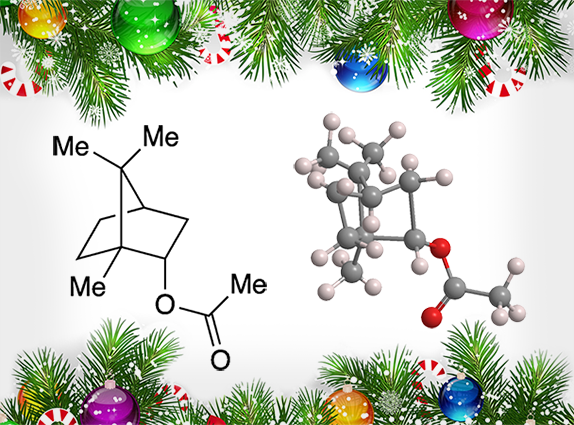What molecule am I?

(+)-Bornyl acetate is the acetate ester of (+)-borneol, a natural terpene derivative. The (–)-enantiomer is also found in nature. Both esters are found in oils extracted from the needles of conifers in the Pinaceae family.
Bornyl acetate’s “piney” aroma makes it a common ingredient of perfumes used in air fresheners, cleaners, and personal care products. It is reported to have anti-inflammatory, analgesic, antibiotic, and sedative properties. The US Food and Drug Administration lists it as an active ingredient in over-the-counter cough and cold medications.
This Christmas Eve, you can be sure that your tree’s aroma is largely attributable to the presence of bornyl acetate.
(+)-Bornyl acetate hazard information
| GHS classification*: flammable liquids, category 4 |
| H227—Combustible liquid |
*Globally Harmonized System of Classification and Labeling of Chemicals.
MOTW update
Imidacloprid was the Molecule of the Week for August 25, 2014. At the time, it was the most widely used insecticide in the world. But the US Environmental Protection Agency and its European counterparts attributed severely declining honeybee populations to the use of imidacloprid and other neonicotinoid insecticides. Now, in an unusual twist, British researchers report that another insecticide, fipronil, which is not a neonicotinoid, is the culprit behind honeybee dieoff. A key finding is that bees accumulate fipronil in their bodies but rapidly eliminate imidacloprid. How regulators will react to this discovery remains to be seen.
(+)-Bornyl acetate fast facts
| CAS Reg. No. | 20347-65-3 |
| Empirical formula | C12H20O2 |
| Molar mass | 196.29 |
| Appearance | Colorless liquid or crystals |
| Melting point | 29 ºC |
| Boiling point | 228–231 ºC |
| Water solubility | 23 mg/L (est.) |

Learn more about this molecule from CAS, the most authoritative and comprehensive source for chemical information.
Molecule of the Week needs your suggestions!
If your favorite molecule is not in our archive, please send us a message. The molecule can be notable for its current or historical importance or for any quirky reason. Thank you!
Stay Ahead of the Chemistry Curve
Learn how ACS can help you stay ahead in the world of chemistry.

